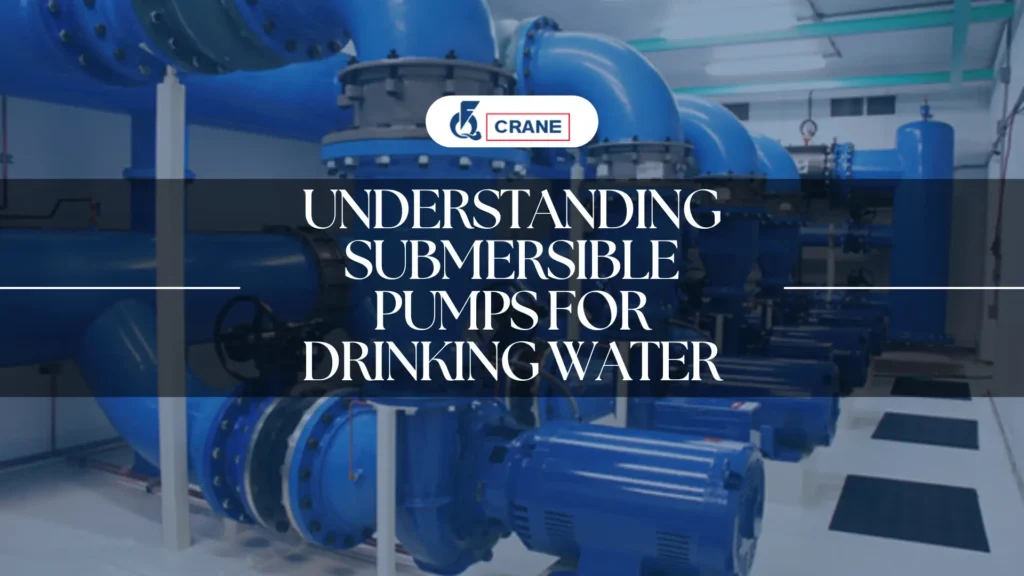Submersible pumps play an indispensable role in ensuring safe drinking water.
Understanding how these work, for what purpose, and why they are important can go a long way toward aiding consumers in making appropriate choices concerning their systems of water supply.
Understanding Submersible Pumps
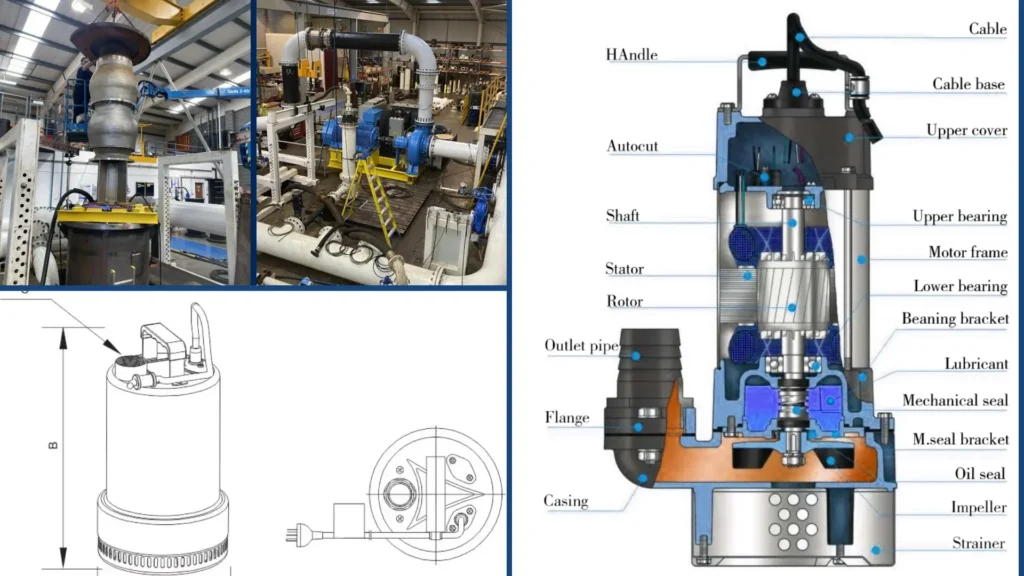
Definition and Working Mechanism
The construction design for submersible pumps is specifically for complete submersion in water.
They act by converting electrical energy into mechanical energy, and hence are able to push water up to the surface.
The construction of the pump includes a motor and a pump body sealed to prevent water entry.
This enables the pump to lift water efficiently, thus finding its application in deep wells among other totally submerged applications.
Learn More:
- What is a Submersible Pump and How Does it Work?
- How to Test a Submersible Pump?
- Understanding Residential and Municipal Submersible Pumps
Types of Submersible Pumps Used for Drinking Water
Deep Well Pumps
These are perfect for extracting water from a grounded level whose depth may go beyond hundreds of feet. They can withhold high pressure and provide plenty of water.
Sump Pumps
Sump pumps are usually applied in house basements to extract the collection of water so that the flooding of water in the basement area can be avoided. By removing the water, the living space is kept dry.
Dewatering Pumps
These find wide applications at construction or mining sites to dewater the workplaces. They can also handle muddy or dirty water and, thus, are quite versatile for use in a variety of situations.
Applications in Residential and Commercial Settings
Household Water Supply
Submersible pumps can ensure a continuous water supply for drinking, cooking, and other sanitary purposes, especially when the municipal water supply is not enough.
Irrigation Systems
In farming, such types of pumps are very important to let the crops have a sufficient amount of water to bring a better yield and food security.
Importance of Drinking Water Safety
Introduction to Drinking Water Quality Standards
Drinking water quality is regulated through set standards by regulatory bodies in various countries; in the United States, for instance, there is the EPA.
These standards are meant to protect public health through providing limits that are permissible for various pollutants.
Common Contaminants in Water Sources
Microorganisms
Bacteria, viruses, and parasites in water supplies could pose serious health risks from gastrointestinal ailments to other diseases.
Chemicals
Pesticides, heavy metals such as lead and mercury, and industrial wastes make water undrinkable. This therefore calls for proper filtration and treatment for safe drinking.
Submersible Pumps Play an Immense Role in Safe Drinking Water
Minimal Chances of Contamination
If correctly installed, the submersible pumps minimize the chances of contaminants entering the water supply.
The sealed designs do not allow the entry of pollutants.
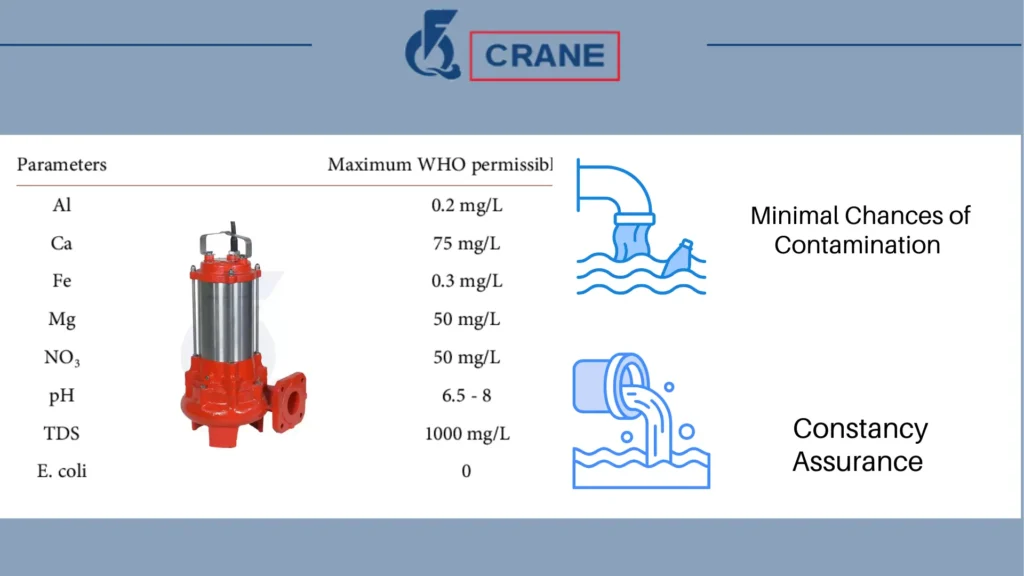
Constancy Assurance
These pumps maintain constant flow of water through the pumps, which is essential for household and agricultural needs to be met by the people to ensure reasonable access to safe drinking water.
Safe Use of Submersible Pumps
Installation Guidelines
Installation of submersible pumps should be installed based on some prerequisites to operate safely.
This includes the placing of the pump at a correct depth and ensuring that the electrical connection is properly and safely connected so that no hazards are posed.
Common Maintenance Practices
Maintenance practices observed in the running of the submersible pumps play a vital role in ensuring these devices continue to deliver their performance. Routine maintenance includes:
Wear and Tear Check
This is vital because, through this process, small problems can be identified well in advance before they become serious.
Cleaning Filters
Filters should be cleaned in order to ensure efficiency and quality of water.
Electrical Component Inspection
The electrical connections must be secure for safety’s sake and free from corrosion.
Professional Help
Professional installation and maintenance could make sure that the pumps are set up correctly.
Professionals with expertise could minimize risks and further improve operating efficiency and extend a pump’s useful life.
Selecting the Right Submersible Pump
Factors to Consider (Capacity, Depth, Water Quality)
There are some critical choices to make when selecting the perfect submersible pump. Here’s why:
Capacity
Estimate how much water your home or building will need. Pumps are rated according to flow rate, usually given in gallons per minute (GPM).
Consider peak usage moments and find out if the pump will sustain such times without low performance.
For example, a big house may need a pump with a higher GPM number to efficiently run several water outlets simultaneously.
Depth
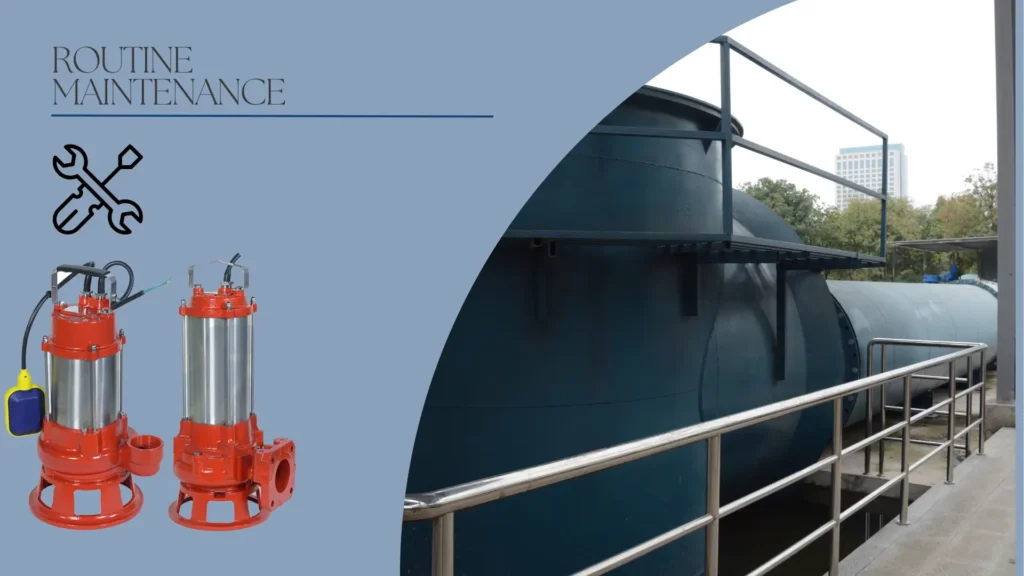
The depth of the water source directly impacts pump selection.
If a source of water is too deep, then generally, a normal pump cannot reach it effectively.
Ensure the pump can achieve the required depth with sufficient pressure.
This will be necessary to confirm that the pump specification can work within the depth of your well or any other water source to avoid underperformance.
Water Quality
Different pumps fit into different water conditions.
Consider the quality of your water source-from any sediment to its chemical composition.
Where the water contains a high level of sediment or debris, opt for pumps featuring hardened components and filtration systems.
Similarly, if your water is full of chemical contaminants, find pumps that can handle certain conditions, such as those with corrosion-resistant materials.
Recommended Brands and Models
For Submersible Pump Selection, some of the most trusted brands have earned their reputation based on the performance and dependability of their machines:
Zhejiang Fengqiu Pump Industry Co., Ltd.
It is among the backbone enterprises of manufacturing pumps and has been approved as a high and new technology enterprise by the State.
With the experience of over 30 years, the company has built a vast global presence through the exportation of high-quality pumps to more than 40 countries in regions like Europe, the United
States, Australia, Southeast Asia, and South America.
Grundfos
A globally recognized manufacturer of premium and highly efficient pumps,
Grundfos offers its line of submersible pumps suitable for both domestic and commercial applications.
Their design is focused on meeting the requirements of long service life and operating efficiency, which has made their pumps popular in the market.
Franklin Electric
The company offers a wide selection of dependable submersible pumps to serve a wide range of purposes-from agricultural to residential water systems.
Franklin Electric pumps are known for their novelty, with cutting-edge technologies that improve performance and life.
Zoeller
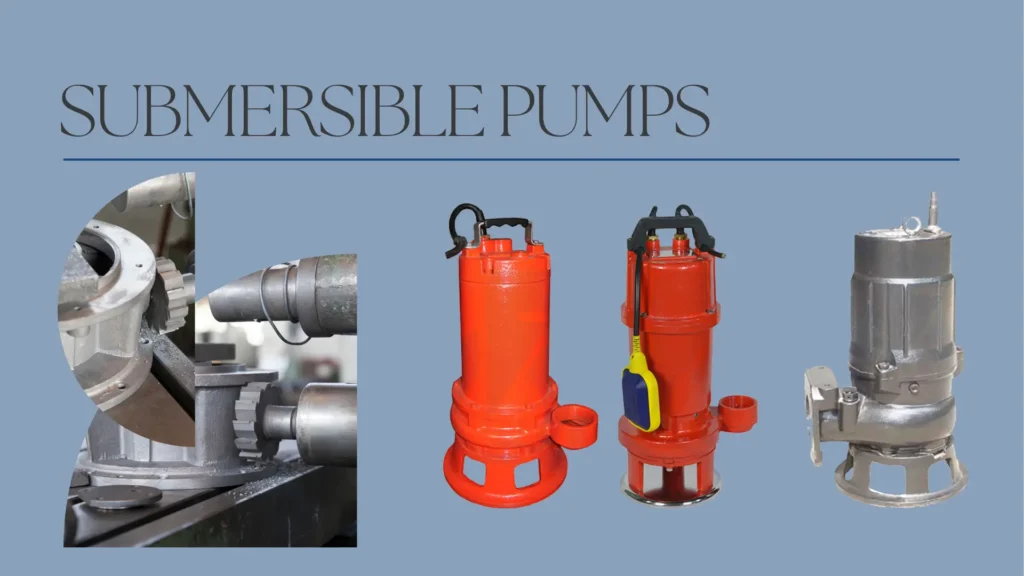
For generations, Zoeller has built high-quality submersible sump and dewatering pumps.
Their reputation is built by producing quality and reliable pumping systems.
Their pumps provide efficient operation even in hostile conditions and hence become one of the most desired in heavy-duty applications.
Cost Considerations and Budget Planning
It is very important to understand all the financial concerns when buying and operating a submersible pump so that you can properly develop your budget
Initial Purchase
The out-of-pocket cost for the real pump will vary greatly depending on capacity, brand, and features.
Do your research to find a model that meets your needs and stay within budget.
If possible, consider long-term value in investing in a higher-quality pump; it may reduce future maintenance costs.
Installation
Professional installation could add to the upfront cost but is often well worth the investment in ensuring proper setup and function.
Prices differ depending on the complication of the setup, so it is best to seek a number of quotes before deciding.
Ongoing Maintenance
Set aside money for frequent checks and repairs for long-term running.
Regular maintenance will prevent costly breakdowns besides adding to the life of your pump.
Provide a plan for maintenance regarding periodic inspection, cleaning, and repair, and budget their costs separately as well.
It saves you from making unplanned expenses later, which increases the efficiency of the submersible pump for a long period.
Drinking Water Pump Safety Measures
Electrical Safety Precautions
That all electrical components are well-grounded and water exposure protected including waterproof connectors, circuit breakers among other electrical hazards.
Avoidance of Contamination during Installation and Operation
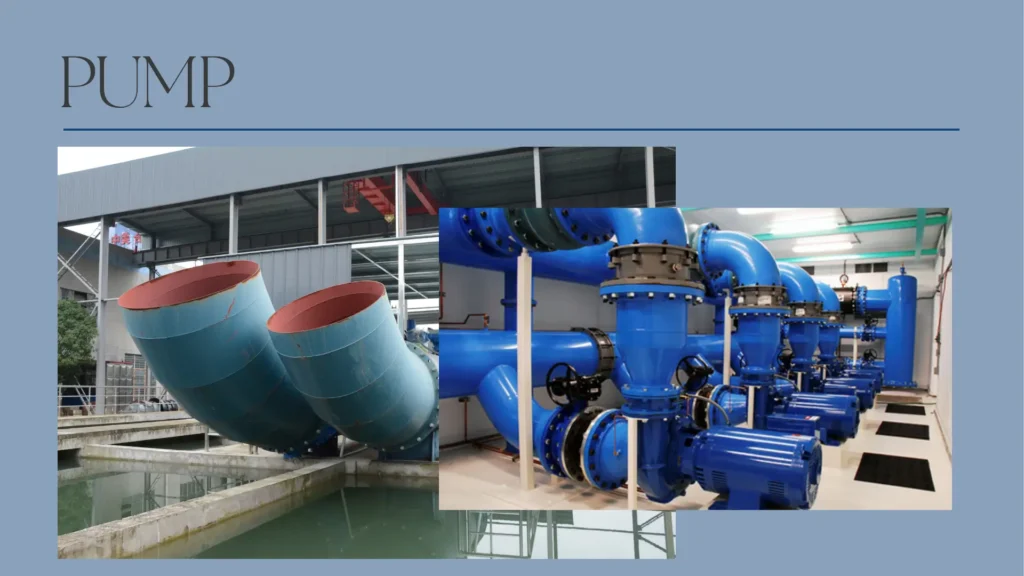
Clean tools and materials should be used to install the pumps so as not to introduce contaminants into the source of water.
The installation of the pump should also be in a clean environment.
Emergency Procedures in Case of Pump Failure
Have a plan for dealing with emergencies, such as the following:
Backup Water Sources
Identify additional supplies of drinking water that could be relied on in case the pump fails for extended periods.
Repair Resources Contact List
Devise a contact list of reliable resources to refer to in an emergency
Monitoring Water Quality
The Need for Regular Testing
Testing the water quality from time to time helps with early detection of contamination, whether it is safe to drink or not.
This is very important with private water systems where municipal oversight may not be present.
Suggested Testing Methods and Frequencies
Use appropriate testing methods including:
Laboratory Testing
Water samples can be collected and then sent to certified laboratories where a wide range of parameters is tested for.
Home Testing Kits
Home test kits for rapid, preliminary testing for common contaminants.
Resolving Issues in Water Quality without Delay
Tests that indicate problems should be followed promptly by actions that will solve these. In this regard, the following are to be considered:
Installation of Filters
Consider installing filters in proper places to remove contaminants.
Seek Expert Opinion
Engage the professional services of experts in water treatment to take up consultation and correction of problems.
Environmental Considerations
Impact on the Local Ecology
While necessary for the water supply, submersible pumps can have impacts on local ecosystems if managed irresponsibly.
Over extraction can lead to depleted water tables and disturbance to local wildlife.
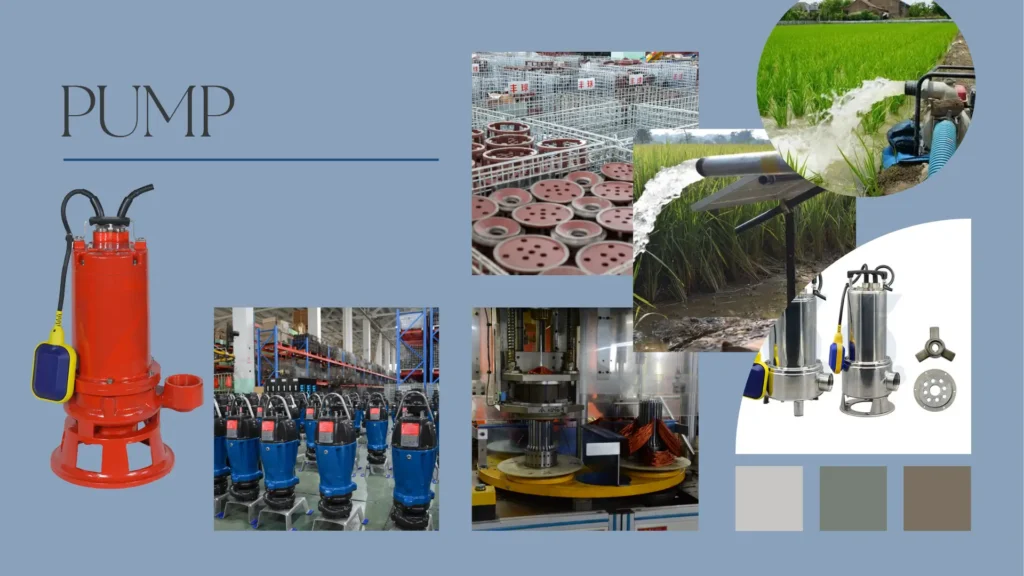
Water Extraction Sustainable Practices
Adopting of sustainable practices that include:
Limiting the Extraction Rate
Avoid over-withdrawal of water to protect the resource locally.
Monitoring of Water Levels
Continuous monitoring of water levels in relation to the rate of extraction, allowing extraction at rates less than natural recharge.
Regulations and Guidelines
Observe local laws concerning the extraction of water.
In many communities, there are provisions in legislation that allow the responsible extraction of groundwater for the protection of environmental integrity and public health.
Is a Submersible Pump Safe for Drinking Water?
Yes, submersible pumps will not harm the drinking water, provided they are installed and cared for appropriately.
They guarantee clean and sure access to water, hence constituting an indispensable part of many homes and businesses.
Conclusion
Submersible pumps can literally provide safe and dependable access to drinking water in many cases where a municipal supply is not available.
Safety during installation and operation avoids problems and ensures long-term dependability.
The key to the best service is maintenance and monitoring on a regular basis.
Taking the time to learn about your submersible pump and how to maintain it saves your health and the environment.
An informed decision encourages a safer and more sustainable water supply.

